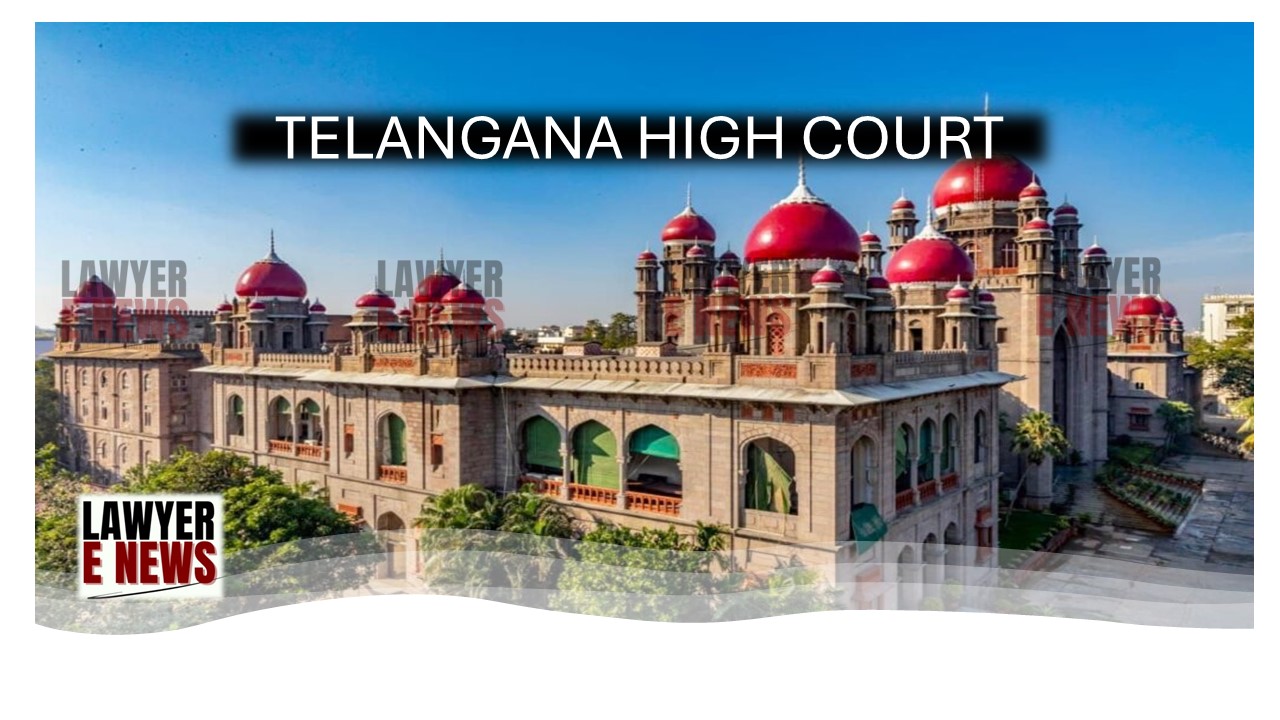-
by Admin
15 February 2026 5:01 PM



"The Speaker, while exercising powers under the Tenth Schedule, acts as a tribunal and must decide disqualification petitions within a reasonable period to uphold the Constitution's integrity": Telangana High Court, On November 22, 2024, delivered its judgment in a significant case concerning the adjudication of MLA disqualification petitions. A division bench comprising Chief Justice Alok Aradhe and Justice J. Sreenivas Rao directed the Speaker of the Telangana Legislative Assembly to decide pending disqualification petitions filed under the Tenth Schedule of the Constitution within a "reasonable time." The Court emphasized the constitutional importance of resolving such matters promptly to prevent subversion of democratic principles.
The case involved disqualification petitions filed by the respondents against certain MLAs for alleged defection. These petitions, filed on July 1, 2024, alleged violations of the Tenth Schedule, which prohibits defection by legislators. When no action was taken by the Speaker, the respondents approached the High Court, seeking intervention to expedite the decision-making process.
On September 9, 2024, a Single Judge ordered the Telangana Legislative Assembly Secretary to place the petitions before the Speaker within four weeks. Aggrieved by this directive, the appellants—the Telangana Legislative Assembly—filed writ appeals arguing that the judiciary could not interfere in proceedings under the Tenth Schedule before a decision was made by the Speaker.
The Court reiterated that the Speaker acts as a tribunal while adjudicating disqualification petitions under the Tenth Schedule. Citing the Constitution Bench decisions in Kihoto Hollohan v. Zachillhu and Rajendra Singh Rana v. Swami Prasad Maurya, the Bench observed:
"The Speaker is a high constitutional functionary whose role under the Tenth Schedule is subject to judicial review. While judicial review at the interlocutory stage is limited, inaction by the Speaker constitutes a jurisdictional lapse that warrants judicial intervention."
The Court noted that the power of judicial review is essential to ensure the Speaker’s adherence to constitutional mandates and prevent delays that undermine democratic processes.
The Court emphasized the principle of "reasonable time" for adjudication of disqualification petitions, as recognized in Keisham Meghachandra Singh v. Speaker, Manipur Legislative Assembly. It stated:
"The Speaker must decide disqualification petitions within a reasonable time. While what constitutes 'reasonable time' depends on the facts of each case, the constitutional objective of the Tenth Schedule demands expeditious action to address defections promptly."
The Bench highlighted that four-and-a-half months had already lapsed since the petitions were filed and directed the Speaker to act in consonance with the Rules and the constitutional mandate.
Addressing the appellants' reliance on the doctrine of non-intervention in legislative matters under Article 212 of the Constitution, the Court distinguished between procedural irregularities and jurisdictional errors. It stated:
"While Article 212 protects legislative proceedings from judicial scrutiny, it does not shield the Speaker’s inaction in exercising his adjudicatory powers under the Tenth Schedule. The judiciary must intervene to prevent erosion of democratic values."
The Bench also referred to the Supreme Court’s ruling in Subhash Desai v. Principal Secretary, Government of Maharashtra, which underscored the Speaker's obligation to decide disqualification petitions within a reasonable period.
The Court set aside the Single Judge's order directing the Assembly Secretary to act and instead issued the following directive:
"The Speaker of the Telangana Legislative Assembly must decide the disqualification petitions filed by the writ petitioners within a reasonable time. While doing so, the Speaker shall consider the period of pendency, the Tenth Schedule's objectives, and the Assembly's tenure."
The Court clarified that its directive was limited to ensuring adherence to constitutional obligations and did not preempt the Speaker’s discretion in deciding the petitions on merit.
This judgment reinforces the importance of timely adjudication in matters of legislative disqualification. By balancing the Speaker's constitutional role with judicial oversight, the Telangana High Court has reiterated the judiciary's commitment to upholding democratic principles and preventing procedural delays from subverting the Tenth Schedule's objectives.
Date of Decision: November 22, 2024
